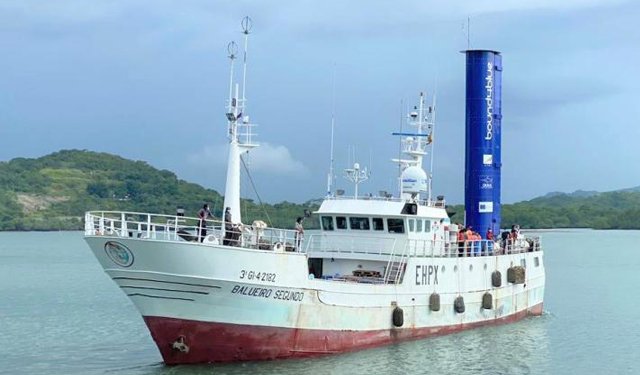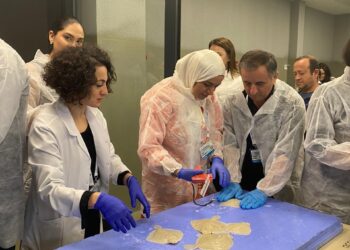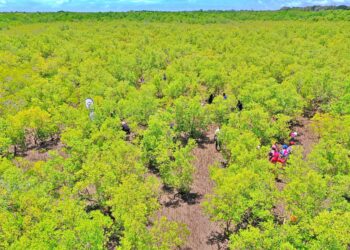Tested a wind propulsion system that reduces fuel consumption and polluting emissions of fishing vessels – The maritime and fishing industry increasingly needs to adapt to higher fuel costs and new regulations to reduce harmful emissions. The Aspiring Wingsails project has developed, tested and validated a wind propulsion system (eSAIL®) that reduces fuel consumption and polluting emissions of fishing vessels. The project received funding under the European Maritime and Fisheries Fund (EMFF). Not only the European fishing industry can benefit, but the European shipping industry as a whole.
eSail® – A promising technology tested on a real fishing vessel
In June 2021, the Spanish start-up bound4blue coordinating the project, together with project partner Kyma (Norway) and Organización de Palangreros de A Guarda (ORPAGU- Spain), successfully installed a 12m eSAIL® on the vessel” Balueiro Segundo” as well as a monitoring system to control fuel economy.
The eSail® uses a stiff sail and wind suction. How does it work? The eSail®, rigid and cylindrical in shape, sucks the wind, which makes the air flow adhere again to the sail, generating lift with low friction: this type of sail produces lift 6-7 times greater than a conventional one, with a minimal energy consumption and no mechanical complexity.
Testing and validation was done by installing a full-scale unit on a fishing vessel. The Balueiro Segundo started sailing in early June 2021, becoming the first fishing vessel in the world to be equipped with an auxiliary wind-assisted propulsion technology and also the first vessel to install bound4blue’s eSAIL® technology.
Two sea trial fishing trips were conducted along standard vessel operation and the project measured energy savings.
A more competitive and sustainable maritime industry
Tests have shown that the wing sail, as it has been continuously improved over the course of the project, can lead to double-digit fuel economy rates for the fishing industry. But the benefits go beyond this sector, as the solution is also suitable for merchant and passenger ships. Therefore, the project can have benefits not only for the European fishing industry, but for the European shipping industry as a whole.
“This installation on the test vessel Balueiro Segundo represents a major milestone for the company, as a first step towards future installations on larger vessels and in different segments, such as tankers, bulk carriers, Ro-Ro or general cargo vessels. Our eSAIL® system is fully scalable; we are already building a 17m high, fully folding unit which will soon be installed on a general cargo vessel, and have also designed larger sails which will soon be in production. Having an active collaboration with shipowners and institutions as catalysts for innovation, such as ORPAGU and the European Union through their support of the Aspiring Wingsails project, has been absolutely key in making this happen,” said José Miguel Bermúdez Miquel ( CEO and co-founder of bound4blue).
In addition to this positive environmental impact for the maritime industry, the project has resulted in a 23% increase in the employment rate of bound4blue employees compared to when the company started the project.
The EMFF fund, which supported the demonstration of the wingsail solution, also helped bound4blue to secure blending finance from the European Innovation Council (EIC) Accelerator Programme. The project has also had a very positive impact on attracting investment, technology and business development. During the final months of the project and soon after its completion, bound4blue signed two more new contracts with top-tier European owners from the Netherlands and France.
A contribution to climate neutrality
By increasing energy efficiency in shipping, the Aspiring Wingsails project supports the EU’s goal of becoming climate-neutral by 2050. It contributes to the EU’s blue economy strategy.
Tested a wind propulsion system that reduces fuel consumption and polluting emissions from fishing vessels







